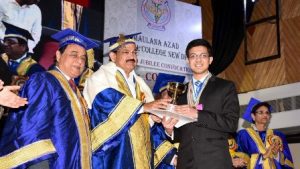Young Doctors must work in rural areas before getting their first promotion: Vice President
Mental wellbeing is crucial and complementary to physical wellbeing, especially in the high stress environment that we live and work in, highlighted M. Venkaiah Naidu.

The Vice President of India, M. Venkaiah Naidu has said that medical students should be trained to adhere strictly to their code of ethics and they should serve in rural areas at least once before getting their first promotion.
Addressing the gathering at the 60th Annual Day celebrations of the Maulana Azad Medical College recently, the Vice President said that India has been in possession of a treasure trove of knowledge in the field of medicine since the ancient times.
“Enlightened healers like Charaka, the author of ‘Charaka Samhita’, Sushrutha, the father of plastic surgery, Nagarjuna who further expanded on the work of Charaka and Vagbhata who authored the ‘Ashtangahridaya’ further added to the robustness of Indian medicine through their scientific explorations and experiments. This glorious legacy of excellence in medicine is still being protected and enriched by the medical fraternity in India,” he said.
“While, all ancient civilisations of the world had developed their own medicinal systems, the healers of ancient India were well-respected and enjoyed state patronage,” he added.
Naidu mentioned that India has made considerable progress in many health indicators including life expectancy at birth which has increased and infant mortality and crude death rates that have been “greatly reduced”.
Diseases such as small pox and polio have been eradicated and leprosy has been nearly eliminated. While we have done reasonably well in controlling communicable ailments, the non-communicable diseases are increasing at an alarming rate and posing a major challenge on the health front, he added.
“The Vice President said that even though India produces the largest number of medical graduates in the world, data shows that doctor population ratio in India is extremely inadequate.”
We need to enhance more medical colleges and every district in the country must have at least one medical college, he said. We must impress upon our young doctors that medical profession is a service to the society and not a lucrative business, he added.
Also read:Promote innovation; invest more time, money in R&D: M Venkaiah Naidu
“There is a deficiency in the number of para-medical personnel and other healthcare professionals who play a supportive role in our health set up. From insufficient number of hospital beds to a glaringly deficient primary health care system, we have inadequate healthcare infrastructure. All these shortcomings need to be addressed on a war-footing to provide universal health coverage,” said the Vice-President.
About the “glaring urban-rural divide in the delivery of healthcare services” with rural areas being served often by unqualified and unaccredited medical practitioners as well as qualified doctors preferring to stay in urban areas, he noted, “I therefore have been advocating the need to make it mandatory for doctors in government service to serve in rural areas for getting their first promotion”.
He further said that India’s burden of non-communicable diseases, also called lifestyle diseases is escalating. The change in environment and resistance to drugs, especially antibiotics has led to the evolution of superbugs which threaten global health security, he added.
Naidu said that we must ensure that our Primary Health Centres have proper facilities and diagnostic services. “More holistically, we must focus our investments upon the social determinants of health: water, sanitation, nutrition, vaccination, early childhood care and so on,” he said.
Stressing that the public health expenditure in India is currently at 1.15 per cent of the GDP whereas the National Health Policy 2017 has recommended increasing the public health expenditure to 2.5 per cent of the GDP by 2025, the Vice President said that there is a need to focus more on Public Private Partnership, especially in building infrastructure and promoting research and development.
Also read:Healthcare corruption: Networks to launch national campaign upholding patients’ rights
The Secretary, Health and Family Welfare, Delhi, Sanjeev Khirwar, the Secretary, Department of Health Research and Director General, ICMR, Dr. Balram Bhargava, the Director, GIPMER, Dr. Archana Thakur, the Dean, MAMC, Dr. Sanjay Tyagi and other dignitaries were present on the occasion.
Speaking about the often neglected and trivialised mental health care, he pointed out that mental wellbeing is “crucial and complementary to physical wellbeing”, especially in the high stress environment that we live and work in.
“From the Surakshit Mathritva Abhiyan to secure maternal health to Mission Indradhanush that aims to achieve 100 percent child vaccination by 2022 to the opening of more than 3000 Jan Aushadhi Kendras to provide affordable medicines, efforts are being made to envision and deploy out of the box, inclusive healthcare solutions, he stated.”
To ensure quality healthcare, 20 new super specialty AIIMS like hospitals are being set up and 73 medical colleges are being upgraded with state-of-the-art infrastructure. As a growing segment, Health insurance in India which hasn’t taken off fully need several measures to improve and expand insurance coverage taking into account the high out-of-pocket expenditure incurred on healthcare, which is driving poor families into unending debt traps, he said.
For constantly setting new benchmarks in quality and affordability of healthcare and encourage medical colleges and universities to keep updating their curricula and teaching methodology, he opined that there is also a need to strengthen “our medical education framework”.
